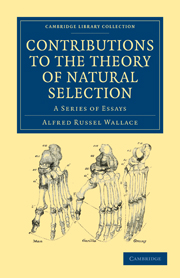Book contents
- Frontmatter
- Preface
- Preface to the Second Edition
- Contents
- I On the Law which has regulated the introduction of New Species
- II On the Tendency of Varieties to depart indefinitely from the Original Type
- III Mimicry, and other Protective Resemblances among Animals
- IV The Malayan Papilionidœ, or Swallow-tailed Butterflies, as illustrative of the Theory of Natural Selection
- V On Instinct in Man and Animals
- VI The Philosophy of Birds' Nests
- VII A Theory of Birds' Nests; showing the relation of certain differences of colour in female birds to their mode of nidification
- VIII Creation by Law
- IX The Development of Human Races under the Law of Natural Selection
- X The Limits of Natural Selection as applied to Man
- NOTES
- INDEX
X - The Limits of Natural Selection as applied to Man
Published online by Cambridge University Press: 29 August 2010
- Frontmatter
- Preface
- Preface to the Second Edition
- Contents
- I On the Law which has regulated the introduction of New Species
- II On the Tendency of Varieties to depart indefinitely from the Original Type
- III Mimicry, and other Protective Resemblances among Animals
- IV The Malayan Papilionidœ, or Swallow-tailed Butterflies, as illustrative of the Theory of Natural Selection
- V On Instinct in Man and Animals
- VI The Philosophy of Birds' Nests
- VII A Theory of Birds' Nests; showing the relation of certain differences of colour in female birds to their mode of nidification
- VIII Creation by Law
- IX The Development of Human Races under the Law of Natural Selection
- X The Limits of Natural Selection as applied to Man
- NOTES
- INDEX
Summary
Throughout this volume I have endeavoured to show, that the known laws of variation, multiplication, and heredity, resulting in a “struggle for existence” and the “survival of the fittest,” have probably sufficed to produce all the varieties of structure, all the wonderful adaptations, all the beauty of form and of colour, that we see in the animal and vegetable kingdoms. To the best of my ability I have answered the most obvious and the most often repeated objections to this theory, and have, I hope, added to its general strength, by showing how colour–one of the strongholds of the advocates of special creation–may be, in almost all its modifications, accounted for by the combined influence of sexual selection and the need of protection. I have also endeavoured to show, how the same power which has modified animals has acted on man; and have, I believe, proved that, as soon as the human intellect became developed above a certain low stage, man's body would cease to be materially affected by natural selection, because the development of his mental faculties would render important modifications of its form and structure unnecessary. It will, therefore, probably excite some surprise among my readers, to find that I do not consider that all nature can be explained on the principles of which I am so ardent an advocate ; and that I am now myself going to state objections, and to place limits, to the power of “natural selection.”
- Type
- Chapter
- Information
- Contributions to the Theory of Natural SelectionA Series of Essays, pp. 332 - 371Publisher: Cambridge University PressPrint publication year: 2009First published in: 1870
- 4
- Cited by



